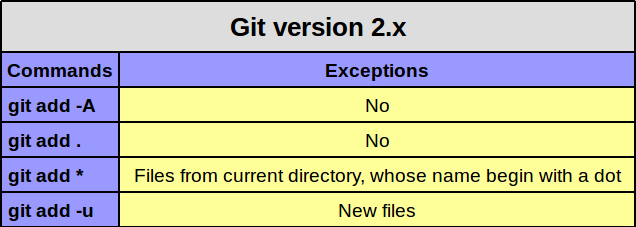I have a question about adding files in git. I have found multiple stackoverflow questions about the difference between git add . and git add -a, git add --all, git add -A, etc. But I've been unable to find a place that explains what git add * does. I've even looked at the git add man page, but it didn't help. I've been using it in place of git add . and my co-worker asked me why. I didn't have an answer. I've just always used git add *.
Are git add . and git add * the same? Does one add changed files from the current directory only, while the other adds files from the current directory and subdirectories (recursively)?
There's a great chart listed on one of the other stack questions that shows the difference between git add -A git add . and git add -u, but it doesn't have git add *.

Note: I understand what it means to use the asterisk as a wildcard (add all files with a given extension). For example, git add *.html would add all files that have a .html extension (but ignore .css, .js, etc).
Thanks for the help!


git add .again, and it staged a deleted file no problem, unlike theXin that row would suggest. – VorticellaCMD.EXE, you don't have a fancy shell that expands*for you, so this passes the literal*to Git. The result is slightly different than if you are using bash or some other Unix-like shell that does expand*for you. – Bookstack